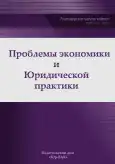Financial and Legal Regulation of the Management of the Military-Industrial Complex in Ensuring the Technological Sovereignty of Russia
- Authors: Petrova G.V.1,2
-
Affiliations:
- Moscow State Institute of International Relations of the Ministry of Foreign Affairs of Russia
- Moscow University. A.S. Griboedov (A.S. Griboedov Institute of International Law and Economics)
- Issue: Vol 19, No 1 (2023)
- Pages: 67-73
- Section: Public Law (State and Legal Sciences)
- URL: https://journal-vniispk.ru/2541-8025/article/view/250087
- DOI: https://doi.org/10.33693/2541-8025-2023-19-1-67-73
- ID: 250087
Cite item
Abstract
Introduction. The topical problems of the development of the financial and legal regime and the organization of the management of the military-industrial complex (DIC) of Russia are considered. The organizational, contractual, corporate, financial and budgetary legal relations that are developing in this area are analyzed. The relevance of the topic is related to the need for a legal assessment of the effectiveness of interaction between state bodies, state corporations, commercial organizations to ensure the execution of state defense orders, the development of the defense industry and the technological sovereignty of Russia. Materials and methods. The norms of the Federal Law «On the Protection and Promotion of Investments in the Russian Federation» dated April 1, 2020 N 69-FZ (as amended on November 21, 2022) and other acts establishing mechanisms for supporting the defense industry have been studied. The basic concepts of the Federal Law «On Industrial Policy in the Russian Federation» dated December 31, 2014 N 488-FZ (as amended on December 5, 2022) on the implementation of the goals and objectives of the development of integrated structures of the defense industry are analyzed. The method of comparative legal analysis of the norms of various laws revealed gaps in the legislation on the state defense order, on scientific research and innovation in the defense industry, on the management of defense industry holdings, etc. Results. Systematized administrative and financial measures and their legal support in strengthening the technological sovereignty of the defense industry. The advantages and difficulties of interaction between the integrated structures of the defense industry and the state authorities of the defense industry in the field of coordination and control of the results of the defense industry are revealed. The financial and legal problems of managing territorial, network, backbone integrated systems of the defense industry, corporations (holdings) in the defense industry are noted. Discussion and conclusions. The complexity of the implementation of financial and legal measures and methods of organizing state budgetary financing of corporations of integrated defense industry systems with state participation are determined. The gaps in the administrative and legal regulation of corporate and holding relations in the network infrastructure organizations of the Russian defense industry in administrative, budgetary legislation, and legislation on supporting scientific research in the defense industry are identified.
Full Text
##article.viewOnOriginalSite##About the authors
Galina V. Petrova
Moscow State Institute of International Relations of the Ministry of Foreign Affairs of Russia; Moscow University. A.S. Griboedov (A.S. Griboedov Institute of International Law and Economics)
Author for correspondence.
Email: galina.v.petrova@mail.ru
SPIN-code: 2700-7493
Dr. Sci. (Law), Professor of the Department of Administrative and Financial Law; Professor of the Department of Constitutional and Administrative Law
Russian Federation, Moscow; MoscowReferences
- Budget Code of the Russian Federation of July 31, 1998 N 145-FZ (as amended on December 28, 2022) (as amended and supplemented, effective from January 1, 2023).
- Decree of the President of the Russian Federation of April 14, 2022 No. 203 «On the Interdepartmental Commission of the Security Council of the Russian Federation on Ensuring the Technological Sovereignty of the State in the Development of the Critical Information Infrastructure of the Russian Federation».
- Federal Law «On the State Defense Order» dated December 29, 2012 N 275-FZ (as amended on December 28, 2022).
- Federal Law «On Science and State Scientific and Technical Policy» of August 23, 1996 N 127-FZ (as amended on December 26, 2022).
- Federal Law «On the Protection and Promotion of Investments in the Russian Federation» dated April 1, 2020 N 69-FZ (as amended on November 21, 2022).
- Federal Law «On Industrial Policy in the Russian Federation» dated December 31, 2014 N 488-FZ (as amended on December 5, 2022).
- Decree of the Government of the Russian Federation of December 22, 2020 N 2204 «On some issues of implementing state support for innovation, including through venture capital and (or) direct financing of innovation projects».
- Andreev V.K. On the sub-sector of civil legislation regulating corporate relations // Journal of Russian Law. No. 7. 2017. P.64–69.
- Konstantinov I.B., Konstantinova E.P. Technological sovereignty as a strategy for the future development of the Russian economy // Bulletin of the Volga Institute of Management. No. 5 (Vol. 22). 2022. P. 12–22.
- Corporate Law: Textbook / Ed. ed. I.S. Shitkin. [Electronic edition]. M.: Statute, 2018. P. 33 (735 p.)
- Petrova G.V., Stupakov V.I. Financial and legal aspects of ensuring the protection of the political, economic, financial sovereignty of the state in the amendments to the Constitution of the Russian Federation, which entered into force on July 4, 2020// Gaps in Russian legislation. —Volume 13. No. 6. —2020. pp. 74–81.
- Petrova G. V., Stupakov V. I. Legal value of the constitutional foundations of budgetary federalism and currency sovereignty in protecting the interests of Russia under sanctions // Problems of Economics and Legal Practice. 2022. V. 18. No. 2. P. 34–41. doi: 10.33693/2541-8025-2022-18-2-34-41.
- Stupakov V.I. Initiatives of the Eurasian states to ensure international and regional information security// International cooperation of the Eurasian states: politics, economics, law. № 3. 2015. p. 72–83.
- Stupakov V.I. International and national norms for regulating the cooperation of Eurasian states in the field of protection and standardization of energy facilities // Problems of Economics and Legal Practice. № 1. 2018. P. 159–163.
Supplementary files








